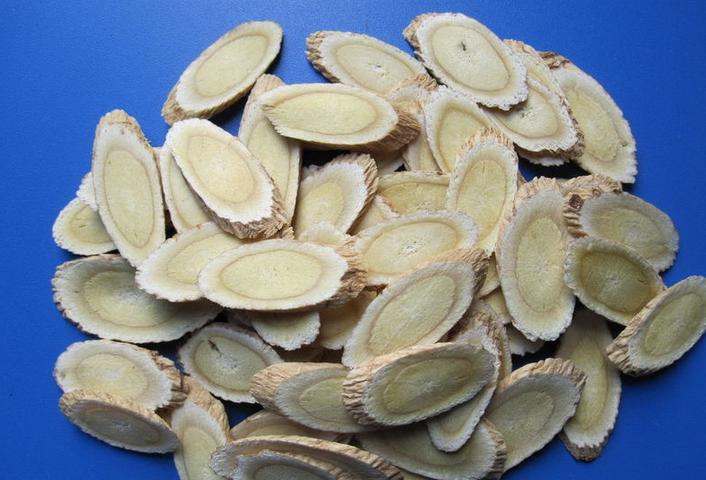Astragalus root slice huang qi
Astragalus Root Profile
Also known as- Astragalus membranaceus, milk vetch, huang qi (chinese), ogi (Japanese), and hwanggi (Korean).
Introduction
Astragalus is the chief energy tonic of traditional Asian medicine. A graceful, flowing plant with long stems bearing paired, pointed leaves and purple flowers, the astragalus is harvested for its roots that are white when dug out of the ground but become yellow as they are dried.
Constituents
Astragalosides and other immunostimulant polysaccharides, beta-sitosterol, flavonoids, and trace minerals, especially selenium.
Parts Used
The dried root in the form of tea, encapsulated or as an extract. Powder is mildly sweet and may be sprinkled on food or whipped into a shake or smoothie.
Typical Preparations
Most authorities on traditional Chinese medicine recommend taking 9-15 grams (3 to 5 tablespoons) of the whole herb per day as a decoction, made by boiling the ground, dried root in water for a few minutes and then brewing the tea. May also be taken in capsule or extract form.
Summary
Traditional Chinese medicine prescribes astragalus for maladies related to deficiencies of the "spleen," the energy body responsible for digesting food and "grounding" the energies of the body in the environment. Diseases treated with herbal formulas featuring astragalus can result from poor nutrition or digestive problems, but they can also be associated with frequent changes of life direction, "flighty" attitudes, or failure to make important decisions.
Modern research shows that simple preparations of astragalus as a whole herb stimulate the immune system in several ways. It increases the number of stem cells in bone marrow, and encourages their maturity into active white blood cells. It appears to help signal the white blood cells known as neutrophils to migrate to places they are needed to fight infection. It stimulates the "germ-eating" white blood cells known as macrophages, activates T-cells and natural killer (NIK) cells, and increases the production of immune globulins. Usually taken with a variety of other herbs, astragalus as a whole herb eases chronic respiratory infections, aids in recovery from both cancer and the side effects of cancer therapy, and enhances health in HIV.
Precautions
Astragalus is non-toxic in any dosages.

